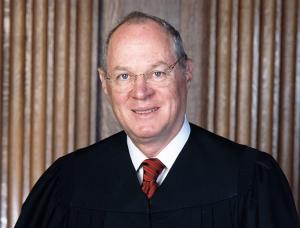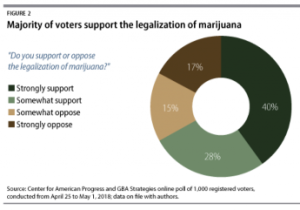A growing coalition with over 150 organizations as of this writing has condemned President Trump's call to institute the death penalty for drug offenses as premised on falsehoods and violating human rights.
The voters defied conservative political and religious leaders by approving a law with no restrictive qualifying conditions.
Study finds counties with highest opioid prescription rates were more likely to favor Donald Trump during the 2016 elections.
The 4th Amendment applies to rental car drivers -- even if they're not listed on the rental form.
The first marijuana-based drug wins FDA approval, Oklahoma legalizes medical marijuana, the Maine legislature approves an overhaul of that state's medical marijuana program, and more.
It's a special Northeast edition of corrupt cops this week, with bad apples being harvested from the Big Apple, Albany, and upstate, as well as New Jersey and Connecticut.
A new marijuana poll has the highest support yet for legalization -- and expungement -- a key House GOP chair blocks another reform measure, Canada's marijuana legalization will go into effect October 17, and more.
NFL players respond to a challenge from President Trump with one of their own, Massachusetts gets its first licensed marijuana cultivator, a US watchdog notes that Afghan opium production is at record highs despite the billions we've spent to suppress it, and more.
The first marijuana-based drug is approved by the FDA, Oklahoma votes on medical marijuana tomorrow, Trump's border politics are raising ire and threatening cooperation in Mexico, and more.
The UN's global anti-drug day sees anti-drug war rallies in dozens of cities worldwide, the Senate approves letting VA docs recommend medical marijuana for vets, New Hampshire Democrats endorse marijuana legalization, and more.
Oklahoma voters pass a very progressive medical marijuana initiative, legalizers win the Democratic gubernatorial nominations in Colorado and Maryland, Maine passes a major medical marijuana overhaul, and, with rightists now in power in Washington and Bogotá, it looks like a new drug war is looming in Colombia.
FOR IMMEDIATE RELEASE: June 26, 2018
CONTACT: David Borden, Executive Director, StoptheDrugWar.org, [email protected]
More Than 150 Organizations Condemn President Trump's Call to Execute People for Nonviolent Drug Offenses
UN to Release Annual "World Drug Report" While Reformers Rally Worldwide
Groups Accuse Singapore of Using False Drug Use Data to Justify Death Penalty

China is doing less of this, but Trump wants more. (Amnesty International)
A growing coalition with over 150 organizations as of this writing (140 when release was first done) has condemned President Trump's call to institute the death penalty for drug offenses. A copy of the statement, which was organized by the US-based NGO StoptheDrugWar.org, is
online here.
The statement was submitted to the UN Office of the High Commissioner on Human Rights, to be considered for inclusion in a report on the death penalty being presented to the General Assembly next fall. David Borden, executive director of StoptheDrugWar.organd the statement's author, explained, "We decided to release the statement at this time because of the immigrant family separations and the US's withdrawal from the Human Rights Council, as another example of President Trump's assault on human rights."
The statement also coincides with the June 26 release of the annual UN World Drug Report, and with the annual Support Don't PunishGlobal Day of Action for health- and human rights-based approaches to drug policy.
Among the statement's signatories are the National Organization for Women (NOW), the Latino Commission on AIDS, the William C. Velasquez Institute, Death Penalty Focus, the National Association of Social Workers, and Housing Works.
The US has never brought a death penalty case for a drug offense, but following the president's call for executions last spring, Attorney General Sessions sent a memo to prosecutors urging them to consider seeking the death penalty in some cases.
The statement argues, with references, that the president's claims of success for drug death penalty approaches in other countries is "premised on falsehoods." It notes that the world's leading executors for drug offenses, China and Iran, have scaled back their use of executions for drug offenses; and accuses Singapore's government of using "faked data" to justify their drugs death penalty.
The statement also makes note of President Trump's suggestion that police officers should bash suspects' heads on car door frames when arresting them, made during a police officers' convention in July 2017; and his repeated calls for violence against protesters at his rallies during the presidential campaign, recorded on video on seven different occasions.
The statement also notes Trump's praise for Philippine President Rodrigo Duterte's brutal campaign of extrajudicial drug war killings, which Duterte administration figures suggest has claimed 20,000 lives to date. The statement has strong representation in the Philippines as well as the Filipino American community, with more than ten endorsing organizations including the iDEFEND human rights coalition, the Free Legal Assistance Group (FLAG), the Philippine Jesuit Prison Service Foundation, and the Filipino American Human Rights Alliance (FAHRA).
The statement calls on Congress to repeal the US's never-used drugs death penalty statutes; to enact bipartisan sentencing reform legislation that is pending in Congress; and to pass legislation sponsored by Senators Ben Cardin (D-MD) and Marco Rubio (R-FL) to impose human rights conditions on some aid to the Philippines while funding public health work and human rights advocacy.
Borden said, "We are committed to recognizing if and when the Trump administration takes good steps in drug policy or criminal justice. Recently the president released Alice Johnson, a 63-year old grandmother who had been imprisoned since 1996 on a drug offense, and he suggested there could be many more pardons. He has offered tentative support for legislation to give formal federal permission to states enacting marijuana legalization, though Republican leadership has blocked the bill from moving. We hope the president follows through on both these promises. In the meanwhile, however, the overall Trump administration record in the drug war is a horrific one."
The full text of the statement and signatory list is online at: https://stopthedrugwar.org/files/trump-death-penalty.pdf.
back to top
One of the reddest of red states went green on Tuesday. Voters in Oklahoma approved a remarkably progressive medical marijuana initiative by a healthy margin of 56% to 43%.

coming soon to Oklahoma (Creative Commons)
The initiative, href="https://www.sos.ok.gov/documents/questions/788.pdf" target="_blank">State Question 778, allows registered patients to possess up to three ounces of marijuana anywhere and up to eight ounces at home. Patients also have the right to grow up to six mature and six immature plants or have designated caregivers do it for them.
It also creates a system of licensed dispensaries, cultivation, and processing facilities and sets taxes at a relatively low 7%. The initiative also bars localities from using zoning laws to block dispensaries (although they wouldn't be allowed within 1,000 feet of a school).
But what is most striking about Question 778 is that it does not restrict access to medical marijuana to a list of qualifying conditions. In fact, the initiative language explicitly states that "[T]here are no qualifying conditions" and that the only limitation on a doctor's recommending medical marijuana is that it must be done "according to the accepted standards a reasonable and prudent physician would follow when recommending or approving any medication."
That is the most wide-open language for a medical marijuana since California's groundbreaking Proposition 215 back in 1996. Prop 215 included a list of qualifying conditions, but also allow recommendations for "any other chronic or persistent medical symptom… that may cause serious harm to the patient's health."
That Prop 215 language allowed medical marijuana to flourish in California and establish itself as something very near to actual legalization. Basically, anybody in the state who had the money to pay for a doctor's visit could get a medical marijuana card -- and they did.
Oklahoma isn't likely to play out like California, but Oklahomans for Health, the folks behind the initiative ought to be feeling pretty good right about now. They have successfully passed a very enlightened medical marijuana law in the face of opposition from the state's Republican and religious establishment.
Conservative religious figures calling themselves Oklahoma for Faith teamed up with the likes of U.S. Sen. James Lankford in a last-ditch effort to derail the initiative. Lankford issued a press release early this month warning that the initiative would be "harmful to the social fabric of Oklahoma."
But voters on Tuesday showed they weren't buying what he was selling.
back to top
The two fevers gripping the land -- opioid addiction and support for Donald Trump -- are related. A new study from University of Texas researchers finds that counties with the highest opioid prescription rates were also more likely to favor Trump in the 2016 election.

One more sign that social distress may drive Trump support. (Creative Commons)
The
study was published Friday in
JAMA Network Open. The cross-sectional analysis examined data from the Census Bureau, Medicare Part D, and
uselectionatlas.org to try to understand what has been deemed the "
Oxy electorate."
Focusing on legally available prescription pain relievers, like oxycodone and hydrocodone, codeine and morphine, but not illegal substances like heroin, the study examined Medicare Part D records for some 3.7 million people in 3,128 of the 3,142 counties in the US. Researchers designated people who had received at least one 90-day supply of prescription opioids as "high opioid users."
Some 693 counties, typically with populations smaller than one million, had rates of opioid prescribing that were significantly higher than the national mean. Another 638 counties were identified as having significantly lower than average opioid use.
In those high opioid use counties, Trump won 59.96% of the vote. In the low opioid use counties, he won only 38.7% of the vote. (Trump won 45.92% of the overall vote.)
Those counties with both high opioid use and high Trump support were largely in the South, Midwest, and southern Appalachia.
The researchers found that the link between opioid use rates and Trump support was as strong as the link between other commonly cited socioeconomic factors -- such as unemployment, household income, and education levels -- and support for Trump. In the high opioid use counties, those other indicators also suggested high levels of social distress. Those counties had higher unemployment rates, fewer adults with a high school diploma, and lower household median incomes than the country as a whole.
Does that mean Trump got the opioid addict vote? No.
"With an ecological analysis, you can't say that. And not only can't you say it, but it's probably not true," said lead author Dr. James Goodwin, chair of geriatric medicine at the UT Medical Branch in Galveston. "If you're stoned out on opioids, you're probably not voting," he told Dallas News.
Instead, he and others suggested, high levels of opioid use tend to correlate with those other indicators of social distress, exacerbating feelings of being left behind or disenfranchised and making voters more likely to support candidates promising to shake things up.
"Trump tapped into something in that segment of voters," said Katharine Neill Harris, a drug policy fellow at the Baker Institute, a nonpartisan think tank of Rice University in Houston. "It's about more than just prescriptions. This is a very complex relationship, and representative of a deeper problem... of problems we are not addressing as a society," she told Dallas News.
This article was produced by Drug Reporter, a project of the Independent Media Institute.
(This article was prepared by StoptheDrugWar.org's 501(c)(4) lobbying nonprofit, the Drug Reform Coordination Network, which also pays the cost of maintaining this web site. DRCNet Foundation takes no positions on candidates for public office, in compliance with section 501(c)(3) of the Internal Revenue Code, and does not pay for reporting that could be interpreted or misinterpreted as doing so.)
back to top
Criminal Court & Legal Affair Investigative Journalist Clarence Walker can be reached at [email protected].
The US Supreme Court recently annulled a major search and seizure case around a rental car filled with heroin with a ruling that could impact the legal rights of Americans who may get stopped by police while driving a vehicle rented by another person. That case is U.S. v. Terence Byrd (#16-1371).

The Fourth Amendment applies even to unauthorized rental car drivers, the Supreme Court rules.
On May 14, Supreme Court Justices released their decision in Byrd's case, announcing when the Fourth Amendment was applied to the evidence in the case that Terence Byrd had "reasonable expectation of privacy while driving a car rented by another party."
Pennsylvania state troopers had arrested Byrd with a large cache of heroin in a car rented by his girlfriend. Police told Byrd he had no right to refuse to consent to a search because Byrd's name was not on the rental agreement. Byrd copped to ten years in federal prison when a district court ruled earlier that Byrd had no expectations of privacy while driving an unauthorized rental car.
The thorny issues the justices had to untangle was whether a second party driver of a rental car like Byrd could legally refuse a police request to search the rental vehicle unless police had a warrant or probable cause, and further whether Byrd was still entitled to protection the under Fourth Amendment. In a unanimous decision, the justices rejected the government's argument that Byrd had no expectation of privacy because he wasn't listed as a second party driver.
"People who borrow rental cars from friends or family are legally entitled to the same protection against police searches as the authorized driver," wrote Justice Anthony Kennedy in the majority opinion. "There may be countless innocuous reasons why an authorized driver might get behind the wheel of a rental car and drive it."

Justice Anthony Kennedy wrote the majority opinion. (USSC)
White House Solicitor General Noel J. Francisco had urged the justices to hold Mr. Byrd to the terms of the rental agreement. "It is common knowledge that car rentals are a personal transaction that does not make the car available for general enjoyment and that the straw man car rentals disserve society by frustrating law enforcement efforts to prevent smuggling and other crimes," he argued.
What is unusual about the Supreme Court ruling in this case is the fact the high court affirmed the defendant's conviction but the justices sent back to the lower appellate court to address important issues as it relates to whether the defendant was entitled to expectation of privacy and not be subjected to "unreasonable search and seizures."
Here are the remanded issues the appeals court, the 3rd Circuit Court of Appeals in Philadelphia, must now consider
(1) Whether an individual "who intentionally uses a third party to obtain a rental car by a fraudulent scheme for the purpose of committing a crime lacks a reasonable expectation of privacy in the rental car driven by the defendant."
(2) Whether the officers had probable cause to search the rental car, and whether these or other issues warrant further remand to the District Court or such issues should be addressed by the court in the first instance.
(3) And if police had any other probable cause to stop Byrd other than the original traffic stop.
New York criminal defense attorney Robert M. Loeb, who argued Byrd's case before the high court, told Drug War Chronicle, "Now we must revisit the same issues that the District Court and the Third Circuit have already decided in favor of the government," he explained. "If the lower court reiterates that officers had probable cause to stop and search the car and seize the drugs under their probable cause theory," Byrd stays in prison," because then the Fourth Amendment doesn't protect him," Loeb explained.
David Rudovsky, a Penn State Professor and search and seizure expert, told the Chronicle, "As the court stated, there is no bright-line rule for second drivers; my view is that long as the driver is not a thief or carjacker, there is a good claim to an expectation of privacy."
The ACLU and the National Criminal Defense Lawyer Association filed a friend brief in Byrd's case, claiming the Supreme court's ruling would likely have an outsized effect on black and Hispanic drivers. "There is a commonly held misconception that car rental is a luxury reserved for the wealthiest individuals," the ACLU filing said. To prove their facts, the ACLU noted that a 2010 tax study found "that more car rentals occur at neighborhood locations than at airport locations."
Studies have shown that black drivers are more likely than white ones to be pulled over by the police and more likely to be searched during the stop.
On appeal to the Supreme Court, Byrd's attorneys had argued: "Whether he was on the car rental agreement was actually irrelevant to whether he had a reasonable expectation of privacy under the Fourth Amendment."
Byrd's attorney had also previously argued before the Third Circuit and the Supreme Court that "millions of car rentals take place annually in the United States." They insisted that if the government won, "Police would have an incentive to pull over a rental car driver who commits a traffic violation because police would know they could search the car if the driver wasn't listed on the rental agreement."
Suspicious Traffic Stop
Terence Byrd's journey to the nation's Supreme Court began on September 17, 2014, at a Budget car rental in Wayne, New Jersey. While Byrd waited outside, Latasha Reed, his girlfriend with whom he sired five children, went into Budget and signed an agreement to rent a new Ford Fusion. Reed's car rental agreement explicitly stated that additional drivers would only be allowed with "prior written consent." Reed did not add Byrd or any other drivers onto the rental agreement.

Driving a rental doesn't mean you give up your rights (Creative Commons)
Once a Budget employee finalized the paperwork, Reed gave the keys to Byrd, who began his trek toward Pittsburg, Pennsylvania. While driving near Harrisburg, Pennsylvania, Byrd came upon State Trooper David Long who later claimed he stopped Byrd for either driving too long in an illegal left lane or while Byrd gripped the steering wheel at the "10 and 2" position, which is known as a "hand play" that many drivers use while holding a vehicle's steering wheel in an unsafe manner, notwithstanding an additional fact that Byrd's driver's seat was too far back reclined!
After running Byrd's driver's license the trooper discovered Byrd had given an alias name of James Carter, and also under Byrd's real name, he had a New Jersey arrest warrant. Ignoring Byrd's right to refuse to consent to a search--officers later claimed Byrd consented to the search--the officers searched the vehicle's trunk and hit the jackpot: 49 bricks of heroin and a police vest. Officers arrested Byrd and subsequently charged him with possession/intent to sell heroin and possession of body armor by a felon.
At a suppression hearing on June 16, 2015, held before Judge Caldwell, State Trooper David Long reiterated the suspicious events that led him to pull Byrd over, which included the officer saying he was unable to see Byrd due to the reclined seat, the "10 and 2" driving position, and the traffic violation.
Byrd's attorney was incredulous: "So the only reason you pulled out to stop my client was the fact he was at "10 and 2" -- and you couldn't see him in the car because his driver's seat reclined too far back?" the lawyer asked. Trooper Long nodded affirmatively.
Byrd's lawyer also drilled the officer about the notion that Byrd's race may have played a role for the officer to stop him. Then, surprisingly, Trooper Long mentioned a third factor that triggered the stop. "In a rental vehicle, he said. "That's what drew my attention to it, yes."
This is when the vehicle rental contract collided with the Fourth Amendment, which forbids unreasonable search and seizure. Trooper Long said he explained to Byrd that he was free to search the car without Byrd's consent because Byrd's name wasn't on the car rental agreement.
After a federal judge refused to throw out the evidence, Byrd accepted a plea bargain for a 10-year prison sentence in exchange for the right to appeal the conviction based on the argument the search violated Fourth Amendment protections against unreasonable search and seizure.
Whether Byrd prevails at the lower court during a hearing scheduled either later in June or July remains to be seen. Meanwhile, Byrd and his attorneys await the outcome with bated breath. Hopefully, the Fourth Amendment wins again. Stay tuned -- we will keep you informed of the outcome.
back to top
The first marijuana-based drug wins FDA approval, Oklahoma legalizes medical marijuana, the Maine legislature approves an overhaul of that state's medical marijuana program, and more.
National
FDA Approves First Marijuana-Based Drug. The Food and Drug Administration has approved GW Pharmaceutical's epilepsy drug Epidiolex. The drug is approved for use in patients two years and older with Dravet Syndrome and Lennox-Gastaut Syndrome, both rare and treatment-resistant forms of epilepsy. "This approval serves as a reminder that advancing sound development programs that properly evaluate active ingredients contained in marijuana can lead to important medical therapies," said FDA Commissioner Scott Gottlieb.
Senate Approves Allowing VA Docs to Recommend Medical Marijuana for Vets. The Senate passed the Veterans Administration FY 2019 appropriations bill on Monday. The bill includes a provision that would allow VA doctors to recommend medical marijuana to their veteran patients. The House Rules Committee blocked that language from being included in the House version of the bill, so now it will be up to a conference committee to decide whether it gets included in the final bill.
Arkansas
Arkansas Supreme Court Removes Cultivator License Roadblock. The state Supreme Court last Thursday threw out a ruling that effectively blocked the state's five approved medical marijuana cultivators from receiving licenses. The ruling ends a series of legal challenges to the awarding process from applicants who did not receive licenses and removes an injunction blocking the state from moving forward with licensing.
Maine
Maine Legislature Passes Medical Marijuana Overhaul. The legislature has passed a sweeping overhaul of the state's medical marijuana program. The bill removes current qualifying conditions and allows doctors to recommend medical marijuana for any ailment and allows caregivers to expand their operations in exchange for tighter regulations. The bill now goes to the desk of Gov. Paul LePage.
Oklahoma
Oklahoma Legalizes Medical Marijuana. One of the reddest of red states went green on Tuesday. Voters in Oklahoma approved a remarkably progressive medical marijuana initiative by a healthy margin of 56% to 43%. The initiative, href="https://www.sos.ok.gov/documents/questions/788.pdf" target="_blank">State Question 778, allows registered patients to possess up to three ounces of marijuana anywhere and up to eight ounces at home. Patients also have the right to grow up to six mature and six immature plants or have designated caregivers do it for them. It also creates a system of licensed dispensaries, cultivation, and processing facilities and sets taxes at a relatively low 7%. The initiative also bars localities from using zoning laws to block dispensaries (although they wouldn't be allowed within 1,000 feet of a school). But what is most striking about Question 778 is that it does not restrict access to medical marijuana to a list of qualifying conditions. In fact, the initiative language explicitly states that "[T]here are no qualifying conditions" and that the only limitation on a doctor's recommending medical marijuana is that it must be done "according to the accepted standards a reasonable and prudent physician would follow when recommending or approving any medication."
Pennsylvania
Pennsylvania Governor Signs Medical Marijuana Research Bill Into Law. Gov. Tom Wolf (D) last Friday signed into law House Bill 2477, which amends the state's medical marijuana law so that its medical marijuana research program can proceed. The bill moved through the state House and Senate last week before landing on Wolf's desk.
[For extensive information about the medical marijuana debate, presented in a neutral format, visit MedicalMarijuana.ProCon.org.]
back to top
It's a special Northeast edition of corrupt cops this week, with bad apples being harvested from the Big Apple, Albany, and upstate, as well as New Jersey and Connecticut. Let's get to it:
In New York City,
an NYPD officer was arrested Monday for not turning in all the cash he seized from a drug suspect, returning the suspect's cell phone, accepting a $250 bottle of Johnnie Walker Blue Label scotch as a thank-you gift, and offering to fix the man's pending court case for $20,000. Officer Johnny Diaz, a 23-year veteran, also helped transport a kilo of cocaine from the Bronx to upper Manhattan in exchange for $4,000. He is initially charged with first-degree possession of a controlled substance, but more charges are pending, officials said.
In Geneseo, New York, a Livingston County correctional officer was arrested last Thursday for allegedly smuggling synthetic cannabinoids into the jail. Raul Santiago, 38, went down after an internal investigation and is now charged with bribery, promoting prison contraband, and official misconduct.
In Hamden, Connecticut, a state prison guard was sentenced last Wednesday to three years' probation for using and peddling steroids. Police serving a search warrant found 25,000 steroid pills and 530 steroid vials. Nicholas Aurora, 34, was using the drugs and selling them to some of his co-workers, authorities said. He pleaded guilty to possession with intent to distribute anabolic steroids.
In Albany, New York, a former state prison guard was sentenced last Thursday to a year and a day in federal prison for coordinating the delivery of 120 pounds of marijuana back in 2011. Brad Rushford, 35, Rushford admitted to providing a driver and scout cell phones to be used in delivering the marijuana. He went down after the shipment got busted en route.
In Toms Rivers, New Jersey, a former Ocean County sheriff's deputy was sentenced last Friday to three years in prison for stealing cocaine that was intended to be used training drug dogs. John C. Adams, 41, admitted using the cocaine himself and falsely reporting that it had been accidentally thrown away with other dog training supplies. He pleaded guilty in November to official misconduct and theft. Adams must serve two years before his eligible for parole.
back to top
A new marijuana poll has the highest support yet for legalization -- and expungement -- a key House GOP chair blocks another reform measure, Canada's marijuana legalization will go into effect October 17, and more.

68% said legalize it in this new Center for American Progress poll. (CAP)
New Poll Has Highest Support Yet for Marijuana Legalization. A poll released Wednesday by the Center for American Progress and the research firm GBA Strategies finds that 68% of Americans now support marijuana legalization. Forty percent "strongly" support while 28% "somewhat" support it. Only 32% of respondents were opposed, 17% of them "strongly." The poll also found strong support for expunging the records of past marijuana convictions, with 70% saying states should "automatically seal the records of individuals convicted of nonviolent felonies or misdemeanors if the person has completed his or her sentence and has not committed another criminal offense."
New York Activists Challenge De Blasio's Marijuana Arrest Moves. Advocates, community organizations, and Council Members held a press conference and rally Wednesday challenging Mayor de Blasio and the NYPD's newly-announced marijuana enforcement policy, urging the Mayor to end racially biased marijuana arrests completely. The mayor and NYPD Commissioner announced the policy shift Monday in the culmination of their 30-day review period to assess marijuana enforcement in NYC. Due to exclusions in the Mayor's new policy, advocates raised concerns that racial disparities in marijuana arrests could continue -- and perhaps increase. They stood strongly opposed to marijuana continuing to be used as a pretext for unnecessary NYPD interactions with community members.
Drug Policy
House Republican Leadership Blocks Resolution Apologizing for War on Drugs. A congressional resolution apologizing "to the individuals and communities harmed by the war on drugs" has been blocked from getting a floor vote by perpetual obstacle to reform House Rules Committee Chairman Pete Sessions (R-TX). In a Rules Committee action Tuesday night, the committee failed to approve the bill for action.
International
Canada Marijuana Legalization Goes Into Effect October 17. Prime Minister Justin Trudeau has announced that marijuana legalization will go into effect on October 17. The delay will allow provinces time to set up retail sales schemes, he said. "It is our hope as of October 17 there will be a smooth operation of retail cannabis outlets operated by the provinces with an online mail delivery system operated by the provinces that will ensure that this happens in an orderly fashion," he told reporters.
Amnesty International Accuses Russia of "Repressive Act of Censorship" for Huge Fine Against Media Outlet for Interview Where Drug Legalization Was Discussed. The Russian government's media regulator has fined the online magazine 7x7 the equivalent of $13,000 for broadcasting an interview with a politician who expressed support for drug legalization. "The extortionate fine imposed on 7x7 is ridiculous," Marie Struthers, Amnesty International's Director for Eastern Europe and Central Asia, said. "This is an act of censorship and a blatant violation of freedom of expression that must be reversed immediately." 7x7 was prosecuted under the country's law against "propaganda for narcotics offenses." "The Russian authorities seem to believe that they can address topical societal issues by shutting down any public debate about them -- on this occasion, by using draconian laws to persecute an independent media outlet," Struthers continued. "The government has already banned public discussion of various topics, such as LGBTI rights, and has labeled peaceful political dissent as 'extremism'. The fine against 7x7 is, without doubt, a message to all Russian media that there will be severe consequences for discussing subjects of public interest that are uncomfortable for the government."
back to top
NFL players respond to a challenge from President Trump with one of their own, Massachusetts gets its first licensed marijuana cultivator, a US watchdog notes that Afghan opium production is at record highs despite the billions we've spent to suppress it, and more.

The US has spent billions to suppress the Afghan opium crop. It hasn't worked, a watchdog says. (UNODC)
Massachusetts Approves First Provisional Marijuana Growing License. A year and a half after voters legalized marijuana in the Bay State, the Cannabis Control Commission has awarded its first provisional license to a marijuana grower. Sira Naturals of Milford has been awarded a Tier 3 cultivation license, which means it can grow marijuana on up to 20,000 square feet of its cultivation facility. Sales are supposed to begin on July 1, but the state has yet to license any retailers.
Medical Marijuana
Arkansas Supreme Court Removes Cultivator License Roadblock. The state Supreme Court Thursday threw out a ruling that effectively blocked the state's five approved medical marijuana cultivators from receiving licenses. The ruling ends a series of legal challenges to the awarding process from applicants who did not receive licenses and removes an injunction blocking the state from moving forward with licensing.
Sentencing and Pardons
NFL Players Ask Trump to Change Excessive Sentences for Nonviolent Drug Offenders. A group of NFL players organized as the Players Coalition wrote a New York Times op-ed challenging President Trump to pardon more nonviolent drug offenders. They said they were pleased by Trump's pardon of Alice Marie Johnson, who had served 20 years of a life sentence for a first-time drug conviction, but noted that "there are a lot of people out there like Ms. Johnson that should be pardoned that don't know a celebrity or an NFL player." The players said that while Trump had challenged them to come up with more names for pardons, that's not the solution: "A handful of pardons will not address the sort of systemic injustice that NFL players have been protesting," the letter to the New York Times read. "These are problems that our government has created, many of which occur at the local level. If President Trump thinks he can end these injustices if we deliver him a few names, he hasn't been listening to us."
Foreign Policy
Afghan Opium Production at Record Levels Despite Nearly $9 Billion in US Anti-Drug Efforts, Watchdog Finds "There's more opium being grown now than when we started, there's more heroin being produced than when we started, there's more heroin being exported, there are more profits from the heroin going to the Taliban and to the other terrorist groups than when we started," said John Sopko, the Special Inspector General for Afghanistan Reconstruction (SIGAR). "If you apply all of the tests, we failed." The latest SIGAR report finds that opium production has topped 9,000 metric tons this year. The US has spent $8.7 billion trying to suppress the crop since it invaded in late 2001.
back to top
The first marijuana-based drug is approved by the FDA, Oklahoma votes on medical marijuana tomorrow, Trump's border politics are raising ire and threatening cooperation in Mexico, and more.

Trump's immigration policies are threatening Mexican cooperation with the drug war and other security issues. (Creative Commons)
Massachusetts Attorney General Wants to Let Localities Extend Marijuana Business Moratoria for Another Year. Attorney General Martha Healey wants to let municipalities extend marijuana business moratoria for twice the time she originally said they needed. She had previously said the moratoria could only last for a year but now wants to double that to two years. The Marijuana Policy Project isn't on board with that: Towns have zoned for tobacco, alcohol, and pharmaceuticals for years," said MPP's Jim Borghesani. "It is a fiction that they need more time to figure out how to zone for cannabis. The only people who will benefit from Maura Healey's ruling are the criminals who have controlled cannabis sales for decades." About 160 cities and towns have a moratorium of some sort in place, most of which were set to expire at the end of the year.
Medical Marijuana
FDA Approves First Marijuana-Based Drug. The Food and Drug Administration has approved GW Pharmaceutical's epilepsy drug Epidiolex. The drug is approved for use in patients two years and older with Dravet Syndrome and Lennox-Gastaut Syndrome, both rare and treatment-resistant forms of epilepsy. "This approval serves as a reminder that advancing sound development programs that properly evaluate active ingredients contained in marijuana can lead to important medical therapies," said FDA Commissioner Scott Gottlieb.
Oklahoma Votes on Medical Marijuana Initiative Tuesday. Sooner voters will go to the polls tomorrow to cast their verdict on State Question 788, an initiative that would create a full-fledged medical marijuana program in the state. Democratic voters will also have a chance to vote for former state Sen. Connie Johnson, one of the state's leading medical marijuana proponents, who is seeking the Democratic gubernatorial nomination.
Foreign Policy
Colombia Cocaine Production Levels "Unacceptable," US Says. Head of the Office of National Drug Control Policy (ONDCP -- the drug czar's office) Jim Carroll said Monday that the record level of cocaine production in Colombia is "unacceptable" and blamed increased supply for pushing increased levels of cocaine use in the US. Given that Colombia's newly elected president, Ivan Duque, is a drug war hard-liner -- a shift from the policies of former President Santos -- Colombia is likely to return to pre-Santos policies attacking coca production, including aerial fumigation.
Citing Immigration Policy, Mexican Legislators Call for End to Security Cooperation With US. Mexican lawmakers last week proposed ending cooperation with the US on immigration, counterterrorism, and fighting organized crime (drug trafficking) "as long as President Donald Trump does not act with the respect that migrants deserve." The proposal came from the Congress's Permanent Commission, which meets while Congress is in recess. The lawmakers asked the presidency to "consider the possibility of withdrawing from any bilateral cooperation scheme" with the US on these issues.
International
Russia Poll Finds Very Strong Opposition to Legalizing Soft Drugs. An annual poll conducted by the research firm VTsIOM has 89% of respondents opposing to legalizing "soft drugs," a term generally considered to refer to marijuana. The numbers are in line with poll results from other years, ranging from 85% in 2004 to 93% last year.
Russia Says Canada's Marijuana Legalization Violates International Law. The Russian Foreign Ministry said last Thursday that Canada is violating international drug control treaties by legalizing marijuana. Those treaties do not allow for "flexible interpretation," the ministry said, adding that it expected other Western countries to chastise Canada. "We expect, that Canada's 'arbitrariness' will merit a response from its G7 partners, since this group has repeatedly declared its commitment to the rule of law in interstate relations," the ministry said.
(This article was prepared by StoptheDrugWar.org's 501(c)(4) lobbying nonprofit, the Drug Reform Coordination Network, which also pays the cost of maintaining this web site. DRCNet Foundation takes no positions on candidates for public office, in compliance with section 501(c)(3) of the Internal Revenue Code, and does not pay for reporting that could be interpreted or misinterpreted as doing so.)
back to top
The UN's global anti-drug day sees anti-drug war rallies in dozens of cities worldwide, the Senate approves letting VA docs recommend medical marijuana for vets, New Hampshire Democrats endorse marijuana legalization, and more.

Activists at last year's Support, Don't Punish Global Day of Action (Facebook)
Maine Bill to Put Legalization to New Vote Dies. A bill from marijuana legalization foe Sen. Scott Cyrway (R-Benton) that would put legalization up to another popular vote has died. LD 667 went down on an 18-13 vote.
New Hampshire Democrats Endorse Marijuana Legalization. The state Democratic Party has adopted marijuana legalization as a party platform plank. Party officials approved the measure during the party convention on Saturday. "We believe that marijuana should be legalized, taxed and regulated."
Medical Marijuana
Senate Approves Allowing VA Docs to Recommend Medical Marijuana for Vets. The Senate passed the Veterans Administration FY 2019 appropriations bill on Monday. The bill includes a provision that would allow VA doctors to recommend medical marijuana to their veteran patients. The House Rules Committee blocked that language from being included in the House version of the bill, so now it will be up to a conference committee to decide whether it gets included in the final bill.
Pennsylvania Governor Signs Medical Marijuana Research Bill Into Law. Gov. Tom Wolf (D) last Friday signed into law House Bill 2477, which amends the state's medical marijuana law so that its medical marijuana research program can proceed. The bill moved through the state House and Senate last week before landing on Wolf's desk.
International
It's Global Anti-Drug Day, Activists Rally for End to Drug War at UN. In response to the UNODC's International Day Against Drug Abuse and Illicit Trafficking, drug reform activists gathered Tuesday at Dag Hammarskjöld Plaza, opposite the United Nations Headquarters in New York, to call for global drug policy reform. The campaign is called Support, Don't Punish, and is hosting events in dozens of cities worldwide Tuesday, as well as the UN action.
More Than 150 Organizations Condemn President Trump's Call to Execute People for Nonviolent Drug Offenses. A growing coalition with over 150 organizations as of this writing has condemned President Trump's call to institute the death penalty for drug offenses. A copy of the statement, which was organized by the US-based NGO StoptheDrugWar.org, is online here. The statement was submitted to the UN Office of the High Commissioner on Human Rights, to be considered for inclusion in a report on the death penalty being presented to the General Assembly next fall. David Borden, executive director of StoptheDrugWar.org (publisher of this newsletter) and the statement's author, explained, "We decided to release the statement at this time because of the immigrant family separations and the US's withdrawal from the Human Rights Council, as another example of President Trump's assault on human rights."
back to top
Oklahoma voters pass a very progressive medical marijuana initiative, legalizers win the Democratic gubernatorial nominations in Colorado and Maryland, Maine passes a major medical marijuana overhaul, and, with rightists now in power in Washington and Bogota, it looks like a new drug war is looming in Colombia.

Cocaine supply is at record levels and Colombia's newly elected president wants to do something about it. (CBP)
Marijuana Legalizers Win Democratic Gubernatorial Nominations in Two States. Colorado US Rep. Jared Polis, a leading congressional proponent of marijuana legalization, won the nomination in his state, while former NAACP head Ben Jealous, who has also called for marijuana legalization, won the nomination in Maryland.
Florida Medical Marijuana Proponent Now Wants 2020 Legalization Initiative. Orlando attorney John Morgan, the man behind the state's successful 2016 medical marijuana initiative, now says he wants to put a legalization initiative on the 2020 ballot. It would "pass overwhelmingly," Morgan said. The longtime Democratic fundraiser pointed to President Trump's recent comments on marijuana: "And I believe in light of President Trump's position, America is ready and willing."
Texas Poll Has Narrow Majority for Legalization. More than half of Texas registered voters polled in the newest University of Texas/Texas Tribune poll support legalizing marijuana. Some 53% said they favored legalizing either small amounts (30%) or any amount (23%). Another 31% would support legalizing medical marijuana, leaving only 16% against legalizing marijuana in any form. A much larger majority -- 69% -- supported reduced penalties for the possession of small amounts.
Medical Marijuana
Maine Legislature Passes Medical Marijuana Overhaul. The legislature has passed a sweeping overhaul of the state's medical marijuana program. The bill removes current qualifying conditions and allows doctors to recommend medical marijuana for any ailment and allows caregivers to expand their operations in exchange for tighter regulations. The bill now goes to the desk of Gov. Paul LePage.
Oklahoma Legalizes Medical Marijuana. One of the reddest of red states went green on Tuesday. Voters in Oklahoma approved a remarkably progressive medical marijuana initiative by a healthy margin of 56% to 43%. The initiative, State Question 778, allows registered patients to possess up to three ounces of marijuana anywhere and up to eight ounces at home. Patients also have the right to grow up to six mature and six immature plants or have designated caregivers do it for them. It also creates a system of licensed dispensaries, cultivation, and processing facilities and sets taxes at a relatively low 7%. The initiative also bars localities from using zoning laws to block dispensaries (although they wouldn't be allowed within 1,000 feet of a school). But what is most striking about Question 778 is that it does not restrict access to medical marijuana to a list of qualifying conditions. In fact, the initiative language explicitly states that "[T]here are no qualifying conditions" and that the only limitation on a doctor's recommending medical marijuana is that it must be done "according to the accepted standards a reasonable and prudent physician would follow when recommending or approving any medication."
Harm Reduction
Ohio Officials Dragging Feet on Federal Needle Exchange Funds, Advocates Charge. The advocacy group Harm Reduction Ohio is accusing the state Health Department of using a bureaucratic delaying tactic to prevent needle exchange programs from accessing any of the funds the state is expected to receive for HIV prevention. Group head Dennis Cauchon said the department is failing to submit a necessary form to the federal Centers for Disease Control and Prevention. "Preventing HIV, hepatitis and drug overdoses are crucial health measures and save massive amounts of money and treatment," Cauchon wrote. Surrounding states submitted the necessary paperwork in 2016, he noted. "The Ohio Department of Health's refusal to support this would be nothing short of reckless, irresponsible and ignorant."
International
UNODC Says Cocaine, Opium Supplies at Record Levels. In its 2018 World Drug Report released Tuesday, the UN Office on Drugs and Crime (UNODC) reported that both cocaine and opium supplies were at their highest ever recorded levels last year. UNODC also described the non-medical use of prescription opioids, such as fentanyl, as a major threat to public health. "Drug markets are expanding, with cocaine and opium production hitting absolute record highs, presenting multiple challenges on multiple fronts," said UNODC Executive Director Yury Fedotov in a statement. "The real problematic issues for us have been the increase in opium production in Afghanistan and the massive increase in cocaine production, particularly because of Colombia," added Thomas Pietschmann, a drug research expert at the UNODC, and one of the lead authors of the report.
Colombia's New Rightist President-Elect Welcomes Trump's Support in New War on Drugs. President-elect Ivan Duque said Monday he welcomed Donald Trump's support for his agenda of a "head-on fight against drug trafficking" during a congratulatory phone call from the US leader. "Today I received a call from the US president where he congratulated us for the results achieved in the last elections and also his commitment to support our security, justice agenda, our agenda of a head-on fight against drug trafficking," Duque told reporters. The US wants Duque to clamp down hard on coca cultivation, which is at record levels. During the campaign, Duque vowed to reinstate the forced eradication of coca crops and the aerial spraying of herbicides over coca farms.
Colombia's Outgoing President Authorizes Use of Drones for Aerial Coca Eradication. Outgoing President Juan Manuel Santos on Tuesday authorized the use of drones to spray herbicides on coca crops. The move comes a day after the US said Colombian coca cultivation had increased 11% last year and cocaine production jumped 19%. Santos' government suspended aerial eradication of coca crops with glyphosate in 2015 after the World Health Organization linked it to cancer. Using low-flying drones would limit the dangers associated with glyphosate, he said.
(This article was prepared by StoptheDrugWar.org's 501(c)(4) lobbying nonprofit, the Drug Reform Coordination Network, which also pays the cost of maintaining this web site. DRCNet Foundation takes no positions on candidates for public office, in compliance with section 501(c)(3) of the Internal Revenue Code, and does not pay for reporting that could be interpreted or misinterpreted as doing so.)
back to top












